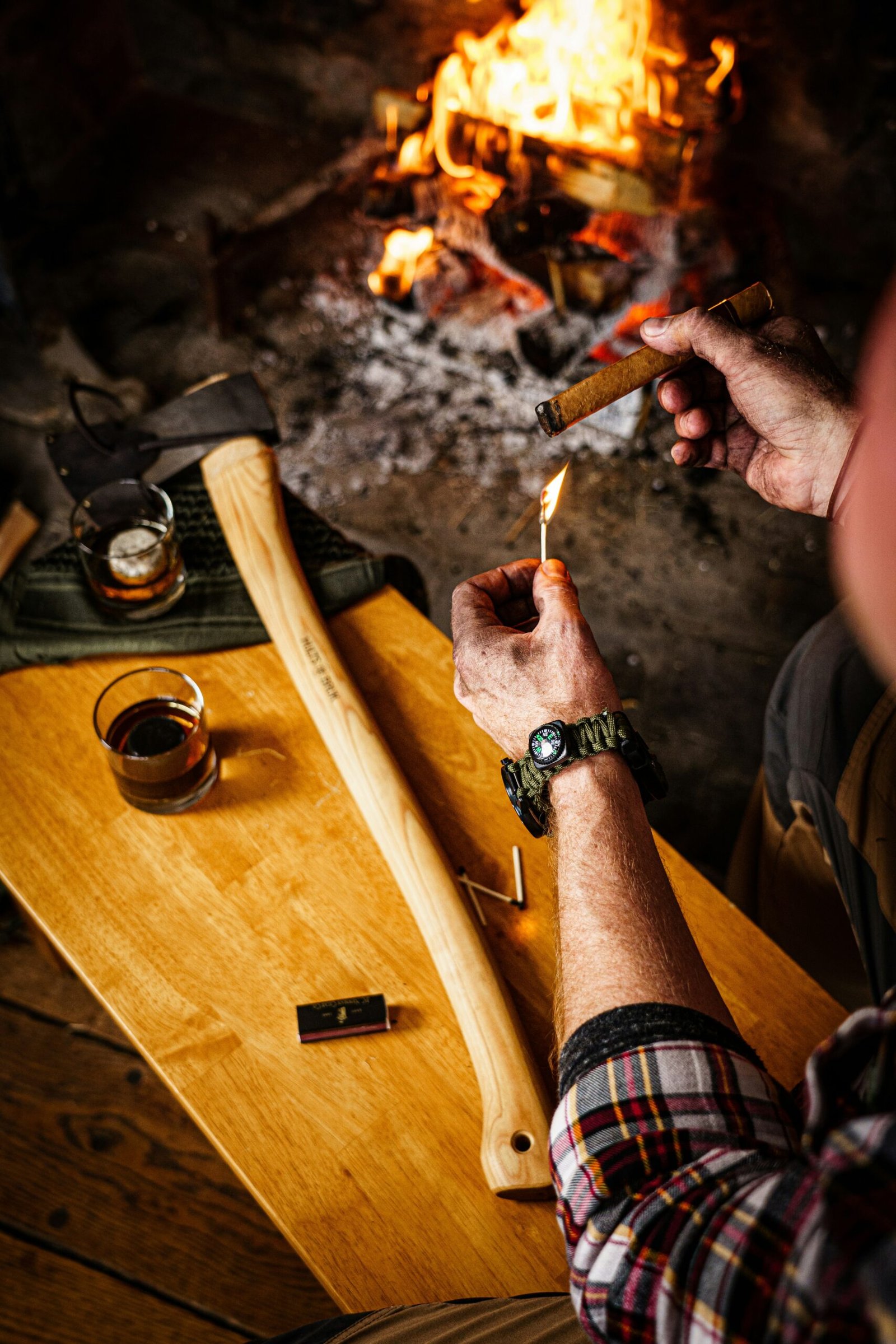
Bushcraft basics encompass a wide range of skills and knowledge that can help you thrive in the wilderness. From building a shelter to finding food and water sources, these fundamental skills are crucial for survival in any outdoor environment. Understanding bushcraft basics not only allows you to be self-reliant, but it also enhances your overall outdoor experience by connecting you more deeply with nature.
One of the key reasons why bushcraft basics are important is that they empower you to be prepared for any situation. When you have a solid foundation in wilderness survival skills, you can confidently venture into unknown territories, knowing that you have the necessary tools and knowledge to handle unforeseen challenges. Whether you are lost in the woods or faced with a sudden change in weather conditions, knowing how to build a fire, navigate using natural landmarks, and create a makeshift shelter can mean the difference between life and death.
Moreover, mastering bushcraft basics can also provide you with a sense of self-sufficiency and independence. Being able to rely on your own skills and resourcefulness in the wilderness can boost your confidence and give you a greater sense of control over your surroundings. This self-reliance not only applies to survival situations but also extends to everyday outdoor activities such as camping, hiking, and backpacking. With a solid understanding of bushcraft basics, you can confidently explore new trails, set up camp, and navigate unfamiliar terrain.
Another benefit of learning bushcraft basics is the deeper connection it fosters with nature. When you are equipped with the knowledge of how to survive and thrive in the wilderness, you become more attuned to the natural world around you. You start to notice the subtle signs of animal presence, understand the importance of different plant species, and appreciate the intricate balance of ecosystems. This deeper connection with nature not only enhances your overall outdoor experience but also instills a sense of respect and stewardship for the environment.
Getting started with bushcraft basics may seem overwhelming at first, but it is a journey worth embarking on. Begin by learning the foundational skills such as fire-making, shelter-building, and navigation. Practice these skills in controlled environments, such as your backyard or local parks, before venturing into more challenging wilderness settings. Consider taking a bushcraft course or joining a local outdoor group to learn from experienced instructors and fellow enthusiasts. Remember, mastering bushcraft basics is a lifelong learning process, so be patient with yourself and embrace the opportunity to continually expand your knowledge and skills.
In conclusion, understanding bushcraft basics is essential for anyone venturing into the wilderness. These skills not only ensure your survival in emergency situations but also enhance your overall outdoor experience and deepen your connection with nature. So, take the time to learn and practice these fundamental skills, and embark on a journey of self-reliance, independence, and appreciation for the natural world.
Bushcraft is a fascinating and multifaceted discipline that goes beyond mere survival skills. It is a way of life that encourages self-reliance, resilience, and a deep understanding of the natural world. When practicing bushcraft, individuals learn to adapt to their surroundings and make the most of what nature has to offer. They become attuned to the rhythms of the wilderness, honing their senses and intuition to navigate through unfamiliar terrain.
One of the fundamental skills in bushcraft is fire-making. Knowing how to start a fire is not only crucial for warmth and cooking but also for signaling for help in emergency situations. Bushcraft enthusiasts learn various techniques, such as using a bow drill or a flint and steel, to create fire from friction. They also explore different fire-laying techniques to maximize efficiency and longevity.
Shelter-building is another vital aspect of bushcraft. In the wilderness, having a sturdy and well-insulated shelter can mean the difference between life and death. Bushcraft practitioners become skilled at constructing shelters using natural materials like branches, leaves, and bark. They learn how to select the right location, assess the terrain, and create a shelter that protects them from the elements.
Foraging for food is an essential skill in bushcraft. In the wild, finding edible plants, mushrooms, and insects can provide sustenance when other sources are scarce. Bushcraft enthusiasts learn to identify and harvest wild edibles, ensuring they have a diverse and nutritious diet. They also develop knowledge of hunting and trapping techniques, enabling them to catch game for food.
Navigation is another critical skill in bushcraft. When exploring unfamiliar territory, knowing how to read maps, use a compass, and navigate by natural landmarks becomes invaluable. Bushcraft practitioners develop a keen sense of direction and learn to navigate without relying on modern technology. They understand the importance of orienteering and can confidently find their way in the wilderness.
Overall, bushcraft is a holistic practice that fosters a deep connection with nature and a profound sense of self-reliance. It encourages individuals to slow down, observe their surroundings, and appreciate the beauty and abundance of the natural world. By mastering the skills of bushcraft, people gain a sense of empowerment and confidence, knowing that they have the knowledge and ability to thrive in any outdoor environment.
Enhanced Physical Fitness and Mental Well-being
Engaging in bushcraft activities can have a positive impact on both your physical fitness and mental well-being. Many bushcraft skills, such as building shelters, gathering firewood, and navigating through rough terrain, require physical strength and endurance. By regularly practicing these skills, you can improve your overall fitness levels and develop a stronger, more resilient body. Additionally, spending time in nature and disconnecting from the stresses of modern life can have a calming effect on the mind, reducing anxiety and promoting mental well-being.
Developed Sense of Responsibility and Environmental Stewardship
Learning bushcraft basics often goes hand in hand with developing a sense of responsibility and environmental stewardship. As you spend more time in the wilderness, you become acutely aware of the impact humans can have on the natural world. You learn to minimize your footprint, practice Leave No Trace principles, and appreciate the delicate balance of ecosystems. This heightened awareness can translate into a greater commitment to protecting and preserving the environment, both in your outdoor adventures and in your everyday life.
Opportunity for Personal Growth and Challenge
Embarking on a journey to learn bushcraft basics presents numerous opportunities for personal growth and challenge. As you push yourself to learn new skills, overcome obstacles, and adapt to unfamiliar environments, you build resilience, confidence, and a sense of accomplishment. The challenges you face in the wilderness can serve as valuable lessons that extend beyond the outdoors, helping you navigate the complexities of life with greater ease and resilience.
Connection with Ancient Traditions and Cultural Heritage
Bushcraft is deeply rooted in ancient traditions and cultural heritage. By learning bushcraft basics, you become part of a lineage that stretches back thousands of years, connecting you to the wisdom and knowledge of our ancestors. Embracing these traditions not only provides a sense of connection and belonging but also allows you to carry forward the skills and wisdom of past generations, ensuring that they are not lost to time.
Opportunity for Adventure and Exploration
Learning bushcraft basics opens up a world of adventure and exploration. With your newfound skills, you can venture into remote and untouched wilderness areas, immersing yourself in the beauty and solitude of nature. Whether it’s embarking on multi-day hikes, canoeing through pristine lakes, or camping in remote locations, bushcraft allows you to experience the thrill of exploration and discover hidden gems that are off the beaten path.
Overall, learning bushcraft basics offers a multitude of benefits that extend far beyond the wilderness. From self-reliance and increased safety to a deepened connection with nature and personal growth, embracing bushcraft can enrich your life in countless ways. So why not take the plunge and embark on this fascinating journey of discovery and self-improvement?
Getting Started with Bushcraft Basics
Now that you understand the importance of bushcraft basics, you may be wondering how to get started. Here are some tips to help you begin your journey:
Education and Training
Start by educating yourself about bushcraft. Read books, watch videos, and take courses or workshops to learn the fundamental skills and techniques. Joining a local bushcraft group or finding a mentor can also provide valuable guidance and hands-on experience.
When it comes to education and training, it’s important to remember that bushcraft is a vast and diverse field. There are various aspects to consider, such as wilderness survival, primitive skills, foraging, and traditional crafts. Take the time to explore different areas of interest and find what resonates with you the most.
Additionally, consider attending bushcraft gatherings or events where you can meet like-minded individuals and learn from seasoned experts. These gatherings often offer workshops, demonstrations, and opportunities to practice your skills in a supportive community.
Practice Makes Perfect
Like any skill, bushcraft requires practice. Start by practicing basic skills such as fire-making, shelter-building, and navigation in a controlled environment, such as your backyard or a local park. As you gain confidence, gradually challenge yourself by venturing into more remote or unfamiliar areas.
Practice not only helps you refine your techniques but also builds your resilience and adaptability in different outdoor scenarios. Consider setting aside regular time for bushcraft activities, whether it’s a weekly outing or a monthly camping trip. The more you immerse yourself in the natural environment, the more you’ll learn and grow as a bushcrafter.
Invest in Quality Gear
Having the right gear can make a significant difference in your bushcraft experience. Invest in quality equipment such as a reliable knife, fire-starting tools, a sturdy backpack, and appropriate clothing. However, remember that bushcraft is about utilizing natural resources, so avoid relying too heavily on gear and focus on developing your skills.
When choosing gear, consider durability, functionality, and versatility. Look for gear that is specifically designed for bushcraft and outdoor activities. Research different brands and read reviews to ensure you’re investing in reliable and long-lasting equipment.
Furthermore, learning how to maintain and repair your gear is an essential skill in bushcraft. Knowing how to sharpen your knife, patch your tent, or waterproof your backpack can save you from potential setbacks during your outdoor adventures.
Respect and Conservation
When practicing bushcraft, it is essential to respect the environment and practice Leave No Trace principles. Leave the wilderness as you found it, minimize your impact, and be mindful of the plants, animals, and ecosystems around you. Conservation and responsible outdoor practices go hand in hand with bushcraft.
Part of respecting the environment is understanding the local regulations and guidelines for outdoor activities. Familiarize yourself with the rules regarding camping, fire-making, and foraging in your area. Additionally, stay informed about any conservation efforts or initiatives that you can support to help preserve and protect natural spaces.
Ultimately, bushcraft is not just about acquiring skills; it’s about cultivating a deep connection with nature and developing a sense of stewardship towards the environment. Embrace the principles of respect and conservation as you embark on your bushcraft journey, and let them guide your actions and decisions in the great outdoors.


